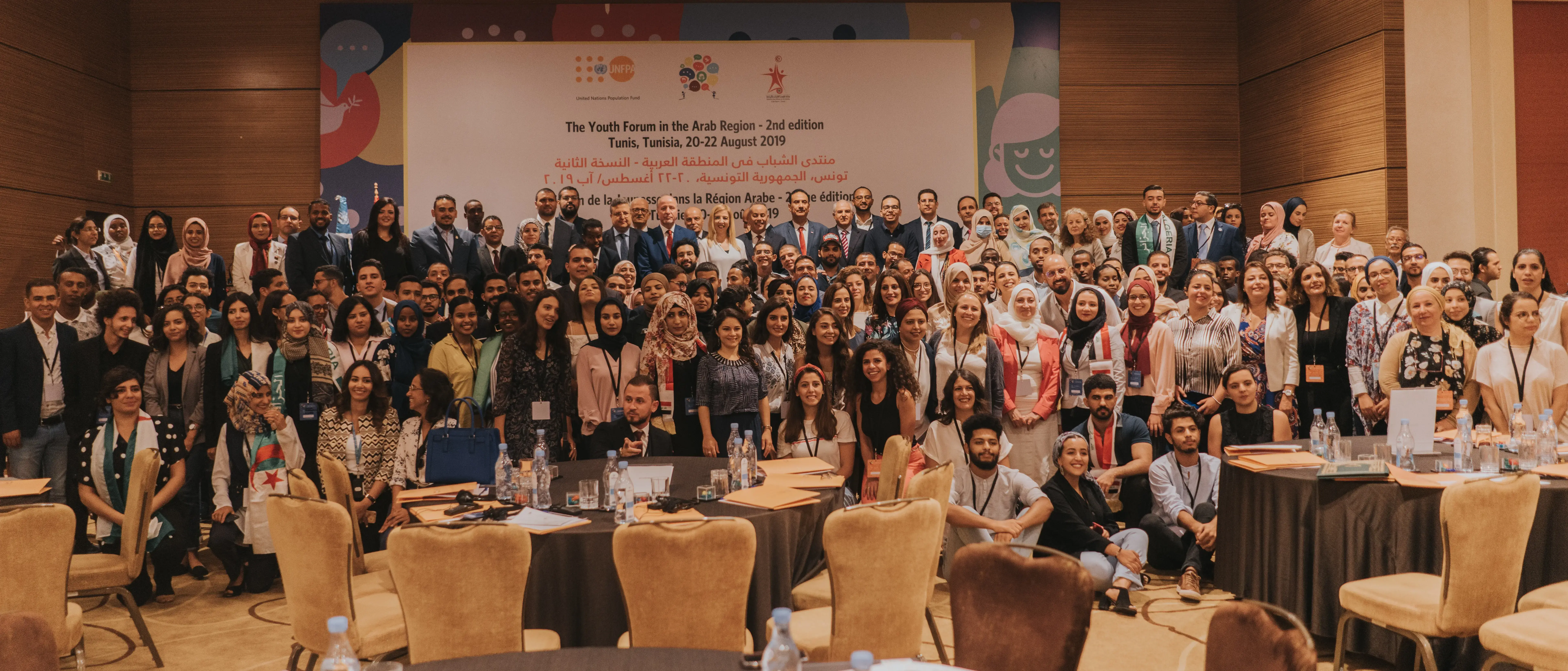Adolescents and youth in the Arab States region
The Arab region is characterized by the largest youth cohort it has ever seen with young people between the ages of 15–29 making up around 30 percent of the population - or some 110 million people - in a region in which 60 percent of the population has not yet reached the age of 30.
Youth in the Arab Region are facing enormous challenges including the lack of adequate and decent work opportunities as well as the highest worldwide and the fastest growing youth unemployment rate increasing from 19.5 to 23 per cent between 2012 and 2020; weak and disempowered public participation; inadequate quality of health and education services including access to and quality of young people friendly health services and life skills; in addition to the compounding significant impact of conflicts, terrorism, instability and with all forms of migration.
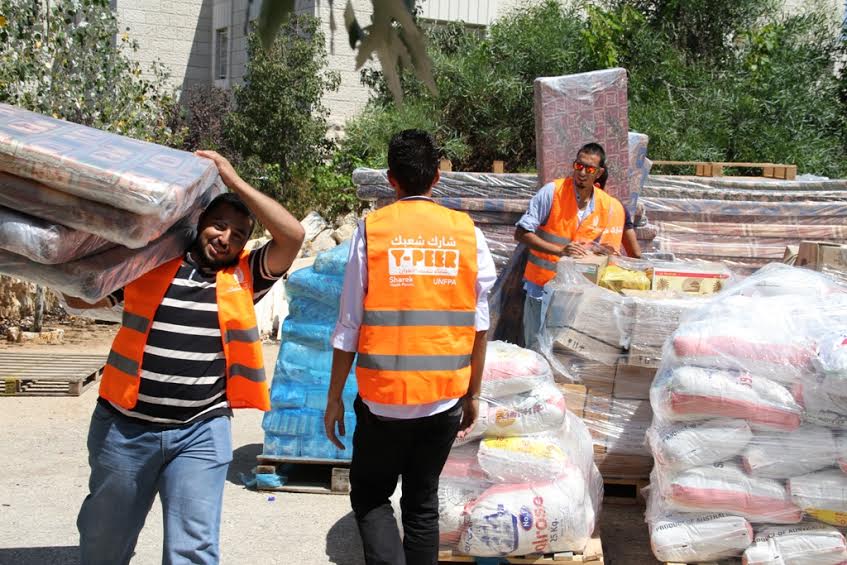
Nevertheless, young people constitute an unprecedented opportunity for their countries and regions. In this connection, there are huge potential benefits if adequate investment is made in the Region’s Demographic Dividend (DD). As such, the region will thrive when young people are empowered to make informed choices, including about their lives –including their sexual and reproductive health and rights- and are significantly engaged as main agents of positive change to achieving sustainable development along with promoting peace, security and prosperity for their countries. Member states acknowledged the key role of young people as drivers for peace and sustainable development through United Nations resolutions, international agreements and conventions, such as the 2030 Agenda for Sustainable Development, the UN Security Council Resolutions 2250 and 2419 on Youth, Peace and Security.
The youth forum in the Arab region
In view of achieving a transformative quality leap for youth in the Arab Region, there is a need to adopt a new paradigm that upholds their rights, fulfill their potential, as well as, and optimize their contribution to sustainable development of their countries. This also warrants the existence of a dedicated dynamic regional space\platform that brings youth together with concerned policy\decision makers and other stakeholders to exchange ideas, information and experiences, explore innovative solutions; as well as, boost dialogue and synergies.
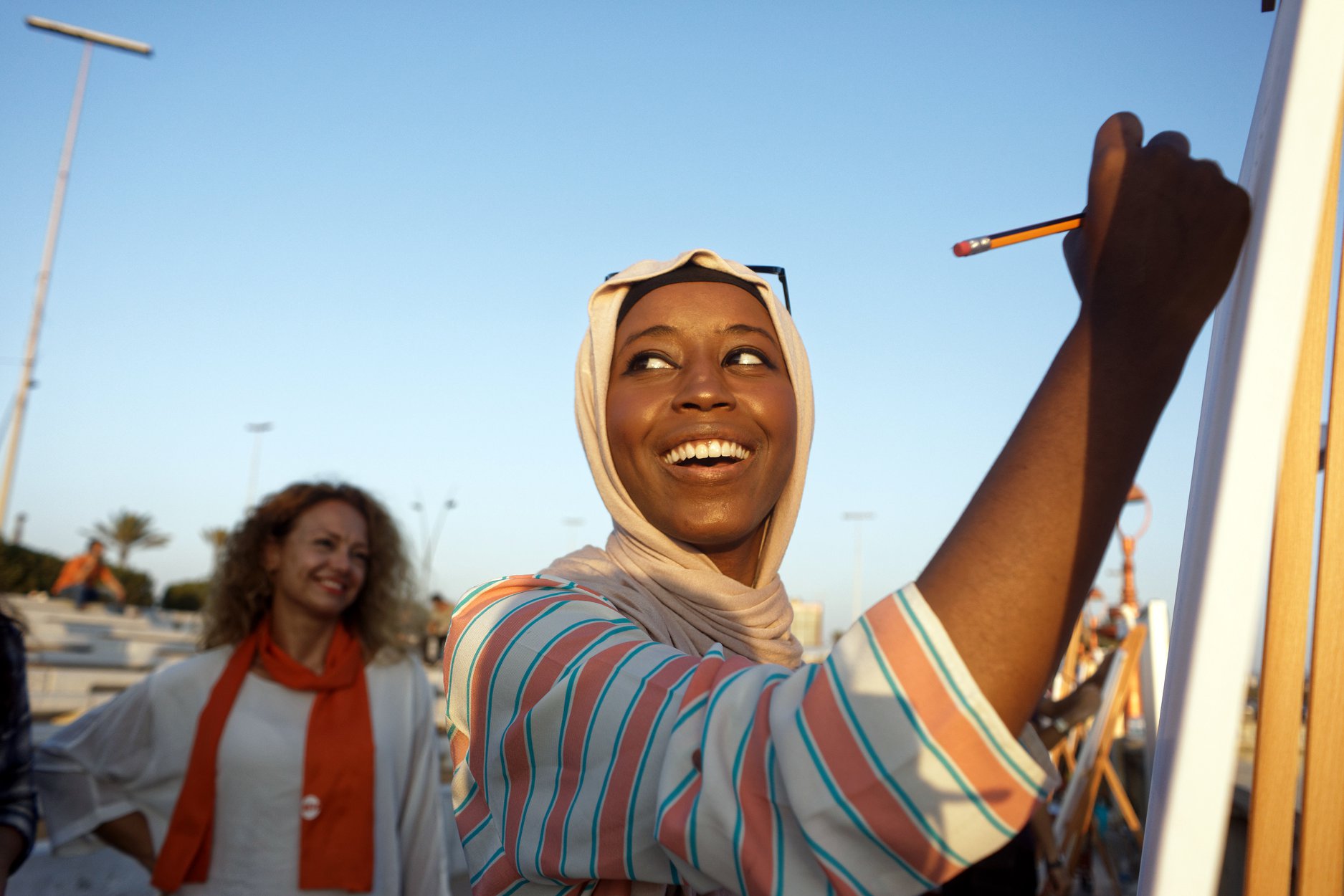
In this connection, the Youth Forum in the Arab Region was established in 2018 as “The Youth Space” in the Arab region with the overall goal of setting and advancing the youth agenda and promoting youth, peace and development in Arab states.
The First edition of the Forum took place on 19-21 December 2018 in Assilah, Morocco. And, as captured in The Assilah Call for Action, the Forum’s main outcomes included: (a) the definition of the elements of the envisaged new paradigm and narrative on youth in the region; (b) the adoption of a Regional Strategic Framework on Youth, Peace and Security in the Arab States; as well as, (c) setting the foundation and guidance for subsequent editions of the Forum.
The United Nations Population Fund (UNFPA) Arab States Regional Office in partnership with the Tunisian Ministry of Youth and Sports and with the collaboration of United Nations Economic and Social Commission for Western Asia (ESCWA), the United Nations Development Programme (UNDP), the World Food Programme (WFP), the United Nations Educational, Scientific and Cultural Organization (UNESCO), and the Global Council for Tolerance and Peace (GCTP) organized the Second Youth Forum in the Arab Region, which was held in Tunis, 20-22 August, 2019.
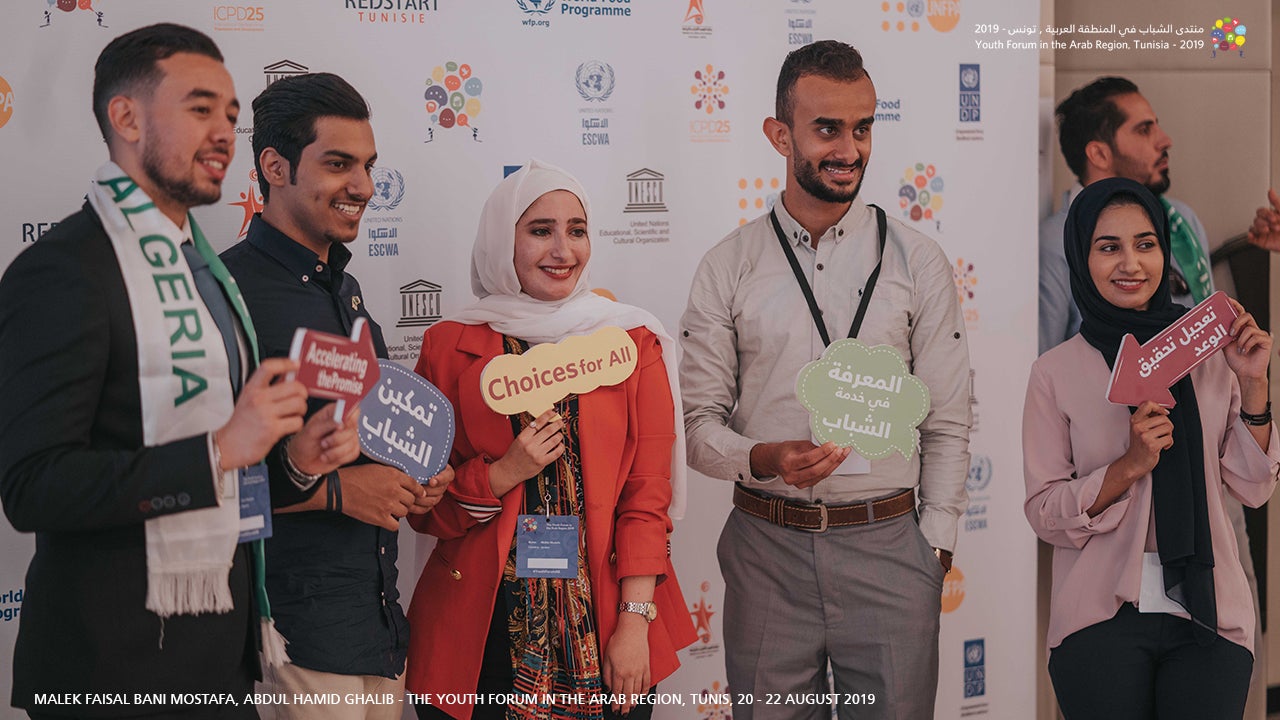
With the overarching theme “Knowledge at the service of youth in the Arab States”, the second Forum gathered more than 250 participants from 20 Arab countries comprising representatives of adolescents and youth, ministers and policy/decision makers, youth and other civil society organizations/ networks, academic and research institutions, artists and influencers, entrepreneurs and the private sector, media, plus, United Nations agencies and other development partners.
The Sessions of the forum focused on defining elements of the main forum theme “Knowledge at the service of youth in the Arab Region” through four Youth Creative Workshops (YCWs), which addressed the following topics: a) Regional Youth Platform; b) Positive Engagement in Policies and Strategies; c) Knowledge and Youth- friendly Programmes and Services; and, d) Accelerators for Youth Contributions to Achieving SDGs.
Under each of these topics, participants came out with recommendations and concrete actions to be implemented. More specifically, the main outcomes of the Forum included:
- Development of the Regional Youth Platform: MINASATY (My Platform), a youth-led digital space that brings youth together to join efforts and find ways and opportunities to strengthen youth development in the Arab region. MINASATY will serve as the backbone of future Youth Forums in the Arab Region, that it becomes a place where youth can convene digitally, share ideas, and work collectively to further the youth agenda in relation to knowledge, programming and policies. The platform would include an education and knowledge dissemination function to facilitate and enable webinars, seminars, information and culture exchange, dialogue and projects to support youth in their quest to work, study and/or collect data insights and infographics on youth to take place and harness the ability of online conferences and conventions to increase knowledge sharing among youth in the region.
- Development of a Youth Charter in the Arab Region as a reference document for youth programmes, policies and strategies. Since the Charter stems from youth and thus reflects their challenges, needs, rights, and freedoms, it is expected to embrace the needs and aspirations of youth living in conflict zones, youth economic empowerment, and implementing national youth policies. The Charter would support the partnership between youth, governments and other stakeholders bent on a common vision about youth issues in the Arab region.
- Develop “Shabab it”, a digital solution for Youth-friendly Services designed to capture and meet youth knowledge, information, educational and health needs. Their aim was to create an instrument or tool that would enable youth to gauge local implementation of programmes and services using physical and digital means.
- Creation of a center that would channel their innovation, initiatives and projects into concrete contributions to the SDGs under the label Knowledge and Innovations Centres (KICs). Youth described the KICs as empowerment spaces where youth would be able to undertake needs assessments, capacity building, responsive innovation projects, and programme implementation on the full range of relevant SDG issues.
In addition, the Forum recommended the:
- Establishment of a regional innovation centre hosted by Tunisia and that would support the institutionalization of the annual forum concept and the proposal and projects it might endorse;
- Pursuing the 2019 Forum’s recommendation to establish a Regional YPS Coalition.
If you’re interested to be part of the youth-led implementation of the Forum’s Regional Project please write to us at benyahia@unfpa.org.
Youth, peace and security
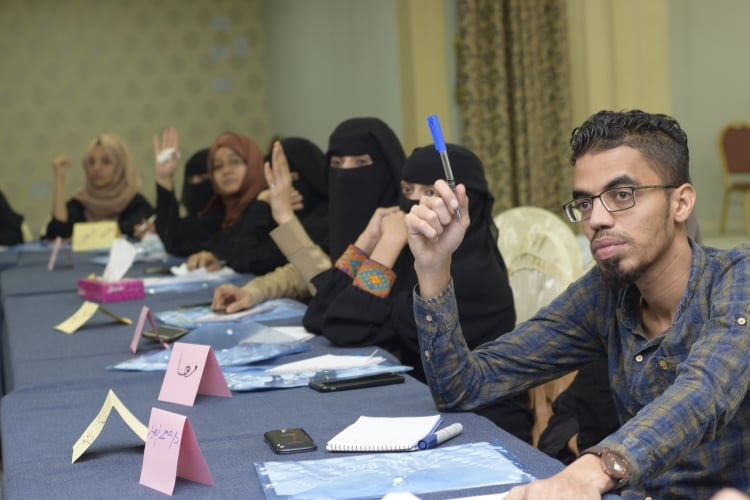
A “Global Forum on Youth, Peace and security” was organized on 21st & 22nd of August 2015 by the Hashemite Kingdom of Jordan. young people, youth-led organizations, NGOs, governments and UN entities came together to agree on a common vision and roadmap to partner with young people in preventing conflict, countering violent extremism and building lasting peace, culminating in the adoption of the “Amman Youth Declaration”. As culmination of these efforts, in December 2015, the UN Security Council unanimously adopted a very first Resolution 2250 on “Youth, Peace and Security”, recognizing that young women and men play an important and positive role in maintenance and promotion of international peace and security. SCR 2250 specifically identifies five main pillars for action: a) Youth Participation; b) Youth Protection; c) Preventive Social Empowerment; d) Youth Re-integration & Disengagement; e) Partnership.
As crucial part for its implementation, the SCR 2250 mandates the Secretary-General “to carry out a Progress Study on Youth’s positive contribution to peace processes & conflict resolution”, to recommend effective responses at local, national, regional and international levels”, to be presented to UN Member States. A Regional Consultation and High- Level Dialogue on Youth, Peace and Security in Arab States, was jointly organized by UNFPA, UNDP, UNESCO, and PBSO and took place from 4-6 December 2016 in Jordan, gathering 65 young people from 18 Arab Countries; as well as decision makers, civil society organizations, and international\regional partners. This event provided an important opportunity to support a strategic dialogue on UNSCR 2250 to support concrete change on the ground.
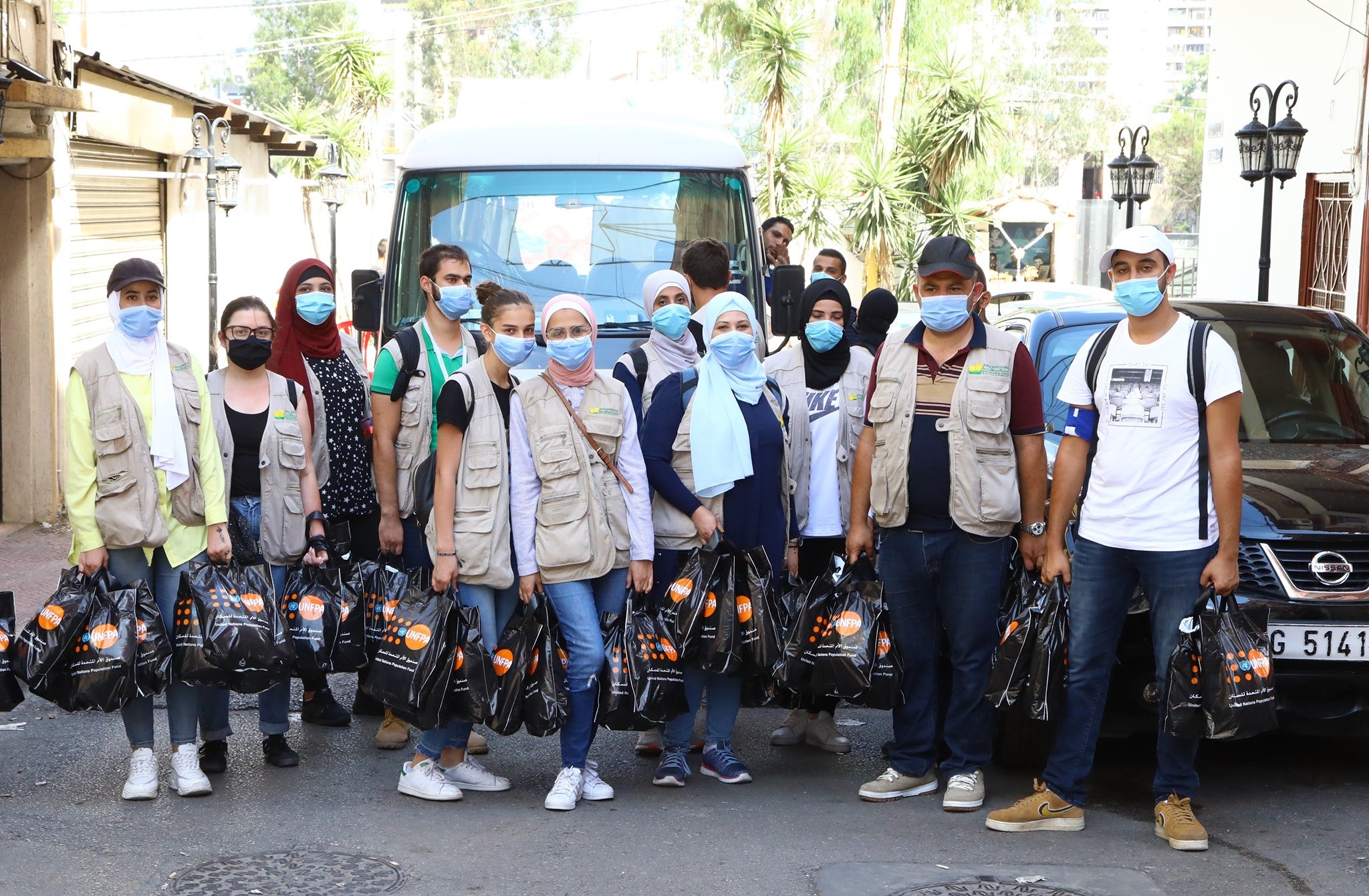
In addition, in its Decision 699, the 2017 Arab Summit endorsed the “Arab Declaration in Support of Joint Effort to Combat Terrorism” that resulted from the “Ministerial Meeting on Terrorism and Social Development: Causes and Solutions” convened by the League of Arab States in March 2017. The Summit further established a ministerial level follow up committee, as well as, tasked the League’s Secretary General to follow up to implement that decision and provide a progress report in its next Summit.
UNFPA ASRO has partnered with the Council of Europe, Union for the Mediterranean, Moroccan Ministry of Youth and Sports, as well as, the ONDE’s Center of Excellence for Arab and African Adolescents and Youth to convene: (a) An international conference entitled "The Mediterranean crossroad of civilizations between Africa, the East and the West: Towards Making Youth, Peace and Security a Reality" on 27 April 2017 in Ifran; as well as, (b) A High- Level Partnership Meeting in support of the Development of a Regional Strategy on Youth, Peace and Security in the Arab States Region on 28 April 2017 in Fes, Morocco. More specifically the objectives were to: (a) Pave the way and promote inter-regional and inter-cultural dialogue and cooperation with particular focus on youth experiences and opportunities; (b) Explore creative means and channels for youth networking and exchanges with focus on Youth, Peace and Security; and, (c) Present the Regional Initiative on Youth, Peace and Security in Arab States; as well as, mobilize partnerships and support to the development and implementation of the regional Strategy on Youth, Peace and Security. Subsequently, together with other recommendations and identified next steps, the partners agreed to draft and share a first regional strategic document that would particularly focus on elements\components that could be part of a Joint Regional Initiative and Action Plan.
During its meeting on 23 May 2017, the Regional UNDG in Arab States “took note of the progress made by UNFPA on partnering with regional entities to develop regional strategic framework on Youth Peace and Security in the Arab region and calls interested R-UNDG members to join this initiative”. Accordingly, UNFPA and UNESCO jointly convened an Expert Group Meeting dedicated to discuss and formulate the 2018 – 2021 Regional Strategy on Youth, Peace and Security (YPS) in Arab States as framework for comprehensive and coordinated action.
UNFPA and its partners invested in supporting conducting national consultations on YPS in Egypt, Libya, Tunisia, Morocco, Palestine and Yemen. In addition, UNESCO and UNFPA jointly organized a Sub-Regional Consultation on Youth Peace and Security in North Africa. In addition, UNFPA supported the establishment of national YPS coalitions\Working groups in Jordan, Iraq, Palestine and Yemen and currently is supporting this in additional countries in addition to the establishment of a Regional YPS Coalition as per the Youth Forum in the Arab Region’s direct recommendation.
Life skills and citizenship education
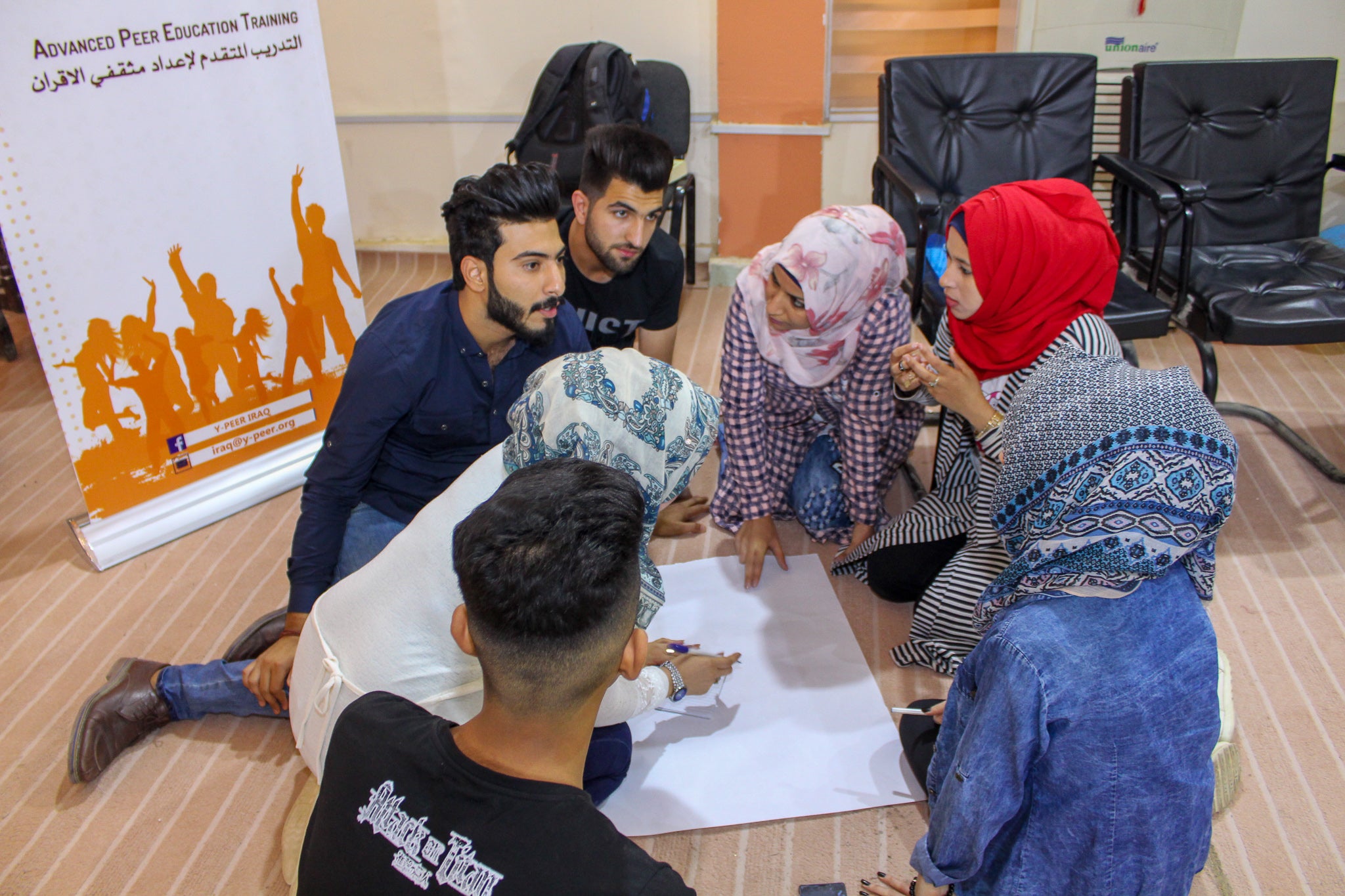
UNFPA is a proud partner of the MENA Life Skills and Citizenship Education (LSCE) Initiative, kicked off in 2015 with the aim of supporting the countries of the region – conceptually, programmatically and technically – to improve learning and to better invest such learning in individual, social and economic development. A set of twelve core life skills for the region has been identified using the four-dimensional learning model: ‘Learning to Know’ (Cognitive Dimension), ‘Learning to Do’ (Instrumental Dimension), ‘Learning to Be’ (Individual Dimension), and ‘Learning to Live Together’ (Social Dimension). The twelve core life skills are life-long and build on evidence that underlines the importance of skills acquisition from an early age. Furthermore, the twelve core life skills are acquired and sustained through all forms of learning in a systems approach that recognizes multiple pathways of learning, formal, non-formal and informal.

Comprehensive sexuality education

UNFPA defines comprehensive sexuality education (CSE) as a right-based and gender-focused approach to sexuality education, whether in school or out of school. CSE is a curriculum-based process of teaching and learning about the cognitive, emotional, physical and social aspects of sexuality.
It aims to equip children and young people with knowledge, skills, attitudes and values that will empower them to:
- Realize their health, well-being and dignity;
- Develop respectful social and sexual relationships;
- Consider how their choices affect their own well-being and that of others; and,
- Understand and ensure the protection of their rights throughout their lives.
When CSE is started early, provided over time and involves all of the key elements, young people are more empowered to make informed decisions about their sexuality, including their SRH, and can develop the life skills necessary to protect themselves while respecting the rights of others. In various settings, sexuality education may go by other names – such as “life skills”, “family life” or “HIV” education or “holistic sexuality education”. These variations sometimes imply differences in content emphasis. However, the core principles must always be present in sexuality education programmes and curricula:
- Respect for human rights and diversity, with sexuality education affirmed as a right
- Critical thinking skills, promotion of young people’s participation in decision-making, and strengthening of their capacities for citizenship
- Fostering of norms and attitudes that promote gender equality and inclusion
- Addressing vulnerabilities and exclusion
- Local ownership and cultural relevance
- A positive life-cycle approach to sexuality
- Evidence about the effectiveness of CSE drives UNFPA’s commitment to strengthen existing sexuality education programmes and to design new programmes, both in and out of school. In this connection,
- Most studies define effectiveness in terms of self-reported risk behaviours (e.g. delayed initiation of sex, decreased frequency of sex, fewer partners, and increased use of condoms and/or other forms of contraception).
- Several reviews of the literature show that about two-thirds of rigorously evaluated CSE programmes lead to reductions in one or more risk behaviours.
- Repeated evaluations have further demonstrated that such education does not foster earlier sexual debut or unsafe sexual activity. In contrast, programmes that teach only abstinence have not proved to be effective.
- The desired outcomes of CSE programmes should be set clearly, based on and evaluated against solid evidence.
- Effectiveness should be measured against desired outcomes such as reduction in rates of unintended pregnancy, STIs and HIV, and in intimate partner violence; transformation of gender norms and advancement of gender equality more broadly; and empowerment of young people as global citizens who are able to advocate for their own rights.
- For the curricula planning stage, critical steps could include assessing local needs, clearly identifying goals and outcomes, involving experts in curriculum development, using a logic model and pilot testing.
CSE is education delivered in formal and non-formal settings that is:
- Scientifically accurate: the content of CSE is based on facts and evidence related to SRH, sexuality and behaviours.
- Incremental: CSE is a continuing educational process that starts at an early age, and where new information builds upon previous learning, using a spiral-curriculum approach.
- Age- and developmentally-appropriate
- Curriculum based: CSE is included within a written curriculum that guides educators’ efforts to support students’ learning. It can be delivered in either in-school or out-of-school settings.
- Comprehensive
- Based on a human rights approach
- Based on gender equality
- Culturally relevant and context appropriate
- Transformative
- Able to develop life skills needed to support healthy choices.
Regional Issue-Based Coalition on Adolescents and Youth
As part of the UN Regional Collaborative Platform for the Arab States, UNFPA co-leads the Regional Issue Based Coalition on Adolescents and Youth.
The objective of this IBC is to develop and implement joint strategic actions responding to the main needs of adolescents and youth in the Region, as per the Global UN Youth Strategy - #Youth2030. The IBC serves as a regional mechanism to support countries in achieving SDGs, in particular SDG 3, SDG 4 SDG 5 and SDG 9 through enhanced knowledge sharing and inter-agency collaboration on critical issues faced by the countries of the region. The work of the IBC will be particularly crucial in a post COVID-19 reality, recognizing the impact the crisis is having on the large number of adolescents and young people in the region including in humanitarian and fragile contexts.
Adolescent Health and Well being
- HIV\AIDS is part of this + And we will also add by Q4 the ongoing regional paper on HIV\AIDS and Youth in the Arab States
- Coverage of other UNFPA and inter-agency products including RMNCAH Strategy document + UNFPA Strategy Document
- Youth and COVID-19: Intro+ add our Guidance Documents + Photo examples of regional and country initiatives supported by UNFPA in AS.

